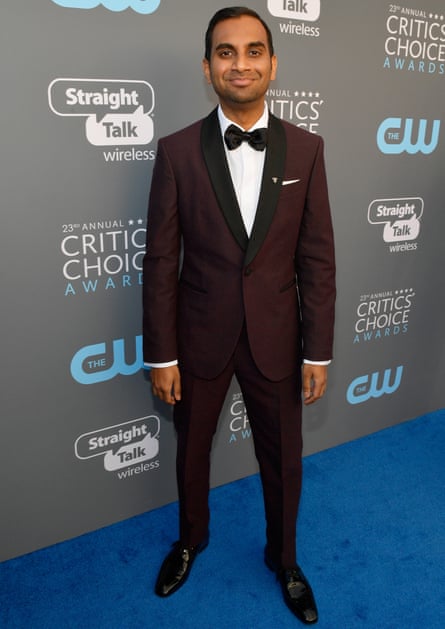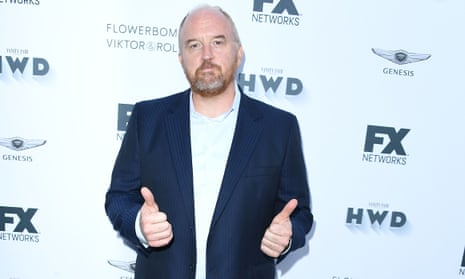Heart disease remains the world’s most dominant threat to the male existence, but it is men that are “the number one threat to women”. So said comedian Louis CK in 2013. How do women even consider going out with men, he asked, when “globally and historically [men] are the number one cause of injury and mayhem to women?” How indeed.
Last year Louis CK went from routinely being referred to as one of the world’s greatest living standups to being outed as a sexual aggressor; a predator who was both frightening and pathetic in the way he used his power to repeatedly masturbate in front of female comics without their consent, and then in effect killed their careers for talking about it. Last week, nine months since he was forced to admit that rumours circulating for years about his behaviour were true and promised he would “step back and take a long time to listen”, he made a comeback at New York’s Comedy Cellar.
His 15-minute set – an unannounced drop-in according to the club’s proprietor – was reportedly given a standing ovation. It didn’t include any of his trademark self-flagellation, no acknowledgement of the mess he has made or the crushing disappointment he has become to the many fans still reeling from processing the transformation of Louis CK, champion of women onstage, to Louis CK, grotesque harasser of women in reality.
He did, however, include a joke about rape whistles. And just like that, without any public contrition, without ever saying “sorry” even in his sole statement on the matter back in November, Louis CK audaciously joins a line of disgraced, powerful men – including news anchors Charlie Rose and Matt Lauer, comedian Aziz Ansari and actor Jeffrey Tambor – reported to be readying a showbiz rehabilitation without making any apparent effort to have a personal one.
Next month marks a year since the #MeToo movement went fully mainstream. More than a decade since Tarana Burke created it on the activist fringe, a wellspring of trauma and anger has been unleashed. Women, as we know, are still learning to articulate the abuse they have suffered. And those same women, as proved by Louis CK’s victims alone, are still dealing with the consequences of further aggression and harassment once they do.
As a culture, we are still reckoning with an unprecedented but seismic societal shift that means the conversation is no longer “just” about criminal acts of rape and assault; the spectrum of unacceptable behaviour being discussed includes the aggressively bad dates, the unchecked misogyny, the casual sexist bullying, the scale of male entitlement that allowed so much of this to slide for so long.
That this debate is largely being shaped by the entertainment industry seems an additionally bad joke: we are relying on the likes of, say, Matt Damon to “get it”. Worse, the discourse is influenced by their publicists, briefing their clients to parrot platitudes on the subject of #MeToo in every interview, or to avoid it altogether.

The fragility of the movement was demonstrated further by last week’s news that one of its most prominent activists, Asia Argento, who accused Harvey Weinstein of rape, covered up an allegation that she had slept with an underage male actor. As a society, we unrealistically expect our victims to be perfect; it becomes difficult to understand that the importance of #MeToo can be separate from the actions of those fighting hardest for it.
And yet. Instead of increasing our understanding of how sexual abuse works and of how we internalise sexism, of how we become better and make progress, we are grappling with the question of whether it’s too soon for Louis CK and a bandwagon of fallen male “heroes” to write off their worst behaviour and stage a form of image laundering.
Is nine months of seemingly pottering about his Manhattan apartment long enough for Louis CK to be left out in exile? If not now, ask his defenders, when would it be OK? Who is to decide what form public retribution should take? If you don’t like it, argues the same crowd, don’t buy tickets to see him. (That Louis CK arrogantly and unexpectedly forced himself on last week’s audience is by the by.) The argument here broadly amounts to: let the moral clarity of the free market decide. After all, in the case of Kevin Spacey, this resulted in box-office takings of $126 (£98) for his newest film, Billionaire Boys Club, on opening night last month.
But what can we learn from a man so recently revealed to have indecently exposed himself and showing little remorse for it? What is his impetus? Louis CK always joked in his sets and throughout his shows about being a schlubby, disgusting, masturbation-obsessed loser. It is no longer funny, so what now?
Like fellow comedian Ansari, whom I interviewed about his book on modern romance and self-proclaimed feminism, Louis CK hasn’t really acknowledged a problem. The detailed account of a date with Ansari which was published online earlier this year was embarrassing and terrible in every sense: both because he appeared to be so tone deaf and awful with women and because, like Louis CK, the persona he has projected and profited from seems so distinctly removed from his real-world personality.
There hasn’t been any admission of therapy or counselling, no sit-down interview in which either man has been challenged, and nothing in their actions to suggest that there is regret for what they have done, bar being caught out.
If comedy purports to equal tragedy plus time, and if nine months still seems a wildly long period for his career to be on hold, consider Louis CK’s arc in the first place: he made his standup debut at an open-mic night in Boston in 1985. It took him two more decades on the circuit until he was rewarded with a coveted spot on an HBO comedy special. It took another 10 years before he became the first comedian to sell out Madison Square Garden three times on a single tour. Taking less than a year off at the peak of his power barely counts as a break.
This rush to rehabilitate the alleged fallen heroes of #MeToo isn’t simply distasteful, it is indecent. For the longest time, the kneejerk has been to argue that the art must be separated from the artist. But what thought for all the art that might have been created, if the canon wasn’t so committed to protecting “flawed” artistic genius instead?
#MeToo isn’t looking to retrospectively destroy all that came before but to understand and learn from it so progress might be achieved. The consensus remains that so many of history’s great but morally dubious artists, from Caravaggio to Picasso, are products of their time. Allowances are made because “it was different back then”. By that same token, let’s remember that Louis CK et al are products of this time. Male abuse of power cannot fly now. That time is up.
